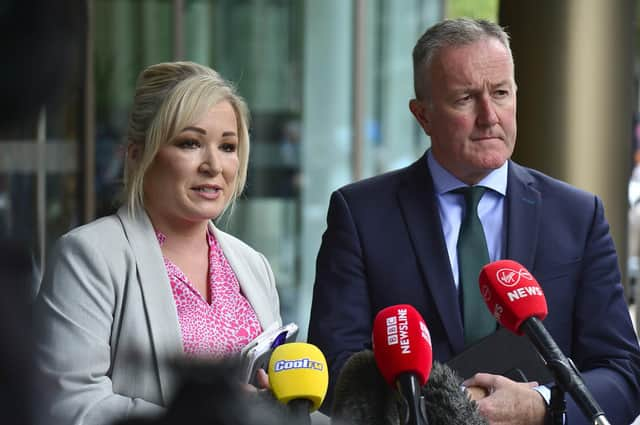Economist says Sinn Fein will face a number of constraints on its all-Ireland economy drive


In her first speech as first minister, Michelle O’Neill said the party would “fully realise” the “huge potential” of the all-Ireland economy. The party appointed Conor Murphy – widely seen as one of their most capable politicians – to the economy brief.
But Dr Birnie says that the party will be constrained in what it can do by a number of factors.
Advertisement
Hide AdAdvertisement
Hide AdHe says Mr Murphy “can certainly alter the tone, mood and rhetoric” of the department – but “whilst Minister Murphy will almost certainly up the rhetoric re a single, all-island economy (just as there will be much more spoken emphasis on addressing gaps in prosperity between different parts of NI) he will be constrained in a number of ways in terms of making actual changes”.
The Ulster University academic said: “To start new initiatives it will be necessary to fund these, in a time of fiscal constraint where will this money come from?”
He continued: “Much of the service delivery of the Department is done by agencies which are at a remove from the Department, notably Invest NI and InterTrade Ireland. Note also that the recent political deal envisages an East-West body counterpart to InterTradeIreland”.
In the government’s Safeguarding the Union command paper – a result of its negotiations with the DUP – it said it would create a new body called InterTrade UK to “support, facilitate and boost trade within the United Kingdom”.
Advertisement
Hide AdAdvertisement
Hide AdThe current government – now in its final year – also challenged the concept of an all-Ireland economy, stating in the document that: “Whilst access to the EU market has broad support amongst business and consumers, the creation of a new political construct of the 'all-island economy' is… divisive in nature and has been rejected by the current Government”.
Mr Birnie argues that much of the orientation of the economy will be decided by businesses themselves. He said: “Business decisions will, ultimately be made by private businesses. Let’s say the economy department has the prospect of a larger inward investment project creating 100s of jobs. Can we really envisage the Minister forcing Invest NI to only grant aid such a project if it means increased sales into RoI as opposed to sales to GB or the USA?”
“In general business and hence society prospers best when governments don’t try to second guess the market – businesses seek out markets and profits anywhere in the world, be that in terms of selling within NI or selling to the rest of the UK or selling to the RoI or exporting more widely. As an economist my main concern would be that the Windsor Framework, even as now being reformed through the Safeguarding the Union deal, still loads some extra costs on some goods coming from GB to NI (particularly in terms of raw materials and components going into NI manufacturing firms which will be forced to use the continuing Red Lane). It is worth noting that during the two years that the Protocol was operating the NI economy did become more “integrated” with its RoI counterpart and less so relative to GB. During those two years purchases of goods from GB grew by about 2% but those from the RoI grew by 35%. Sales to GB grew by 39% but sales to the RoI grew by 47%.”
Comment Guidelines
National World encourages reader discussion on our stories. User feedback, insights and back-and-forth exchanges add a rich layer of context to reporting. Please review our Community Guidelines before commenting.